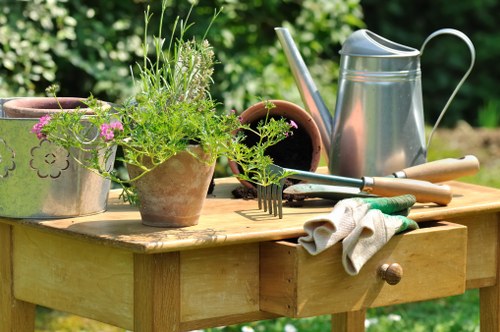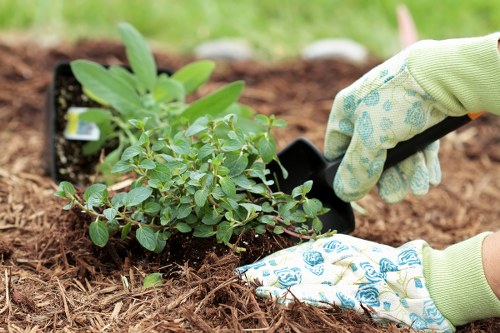The Ultimate Guide to Oven Cleaning with Oven Cleaner

Why Regular Oven Cleaning is Essential
Keeping your oven clean is not just about maintaining its appearance; it's crucial for optimal performance and food safety. Regular cleaning helps prevent buildup of grease and food residues, which can lead to unpleasant odors and even fire hazards.
Over time, spilled food and grease can accumulate on the oven walls, racks, and door, making it harder to cook evenly and increasing the energy consumption of your appliance. By using an effective oven cleaner, you can ensure that your oven operates efficiently and lasts longer.
Moreover, a clean oven enhances the taste and quality of your dishes. Residues from previous cooking sessions can affect the flavor of your food, leading to disappointing meals. Therefore, maintaining a spotless oven is essential for both health and happiness in the kitchen.

Choosing the Right Oven Cleaner
Types of Oven Cleaners
There are several types of oven cleaners available on the market, each with its own set of benefits:
- Spray Cleaners: These are convenient for quick cleaning and are easy to apply.
- Foam Cleaners: Ideal for tackling tough grease and baked-on residues with minimal effort.
- Natural Cleaners: Made from ingredients like vinegar and baking soda, these are eco-friendly and safe for households with children and pets.
- Self-Cleaning Modes: Some ovens come with built-in self-cleaning features that use high temperatures to burn off residues.
Choosing the right type depends on your specific needs, preferences, and the level of cleaning required. For heavy-duty cleaning, foam cleaners are often the most effective.
When selecting an oven cleaner, consider factors such as ease of use, toxicity, and whether it's suitable for your particular oven type. Always read the instructions carefully to ensure best results.

Step-by-Step Oven Cleaning Process
Preparation
Before you begin cleaning your oven, gather all necessary supplies. You'll need an appropriate oven cleaner, protective gloves, protective eyewear, and cleaning tools such as sponges, scrapers, and cloths.
Ensure the oven is completely cool before starting the cleaning process to avoid burns or injuries. Remove all racks, trays, and any other removable parts to make the cleaning process easier.
Lay down some old newspapers or a protective sheet around the oven area to catch any drips or spills from the cleaner. This will help in minimizing the mess and making cleanup easier.

Applying the Oven Cleaner
Proper Application Techniques
Spray the oven cleaner generously on all interior surfaces of the oven, avoiding heating elements and gas burners. For stubborn stains, apply the cleaner and allow it to sit for the recommended time as per the product instructions.
Use protective gloves to prevent skin irritation, and ensure the area is well-ventilated by opening windows or turning on a fan. This helps in dispersing any strong fumes from the cleaner.
After the designated time has passed, use a scraper or non-abrasive scrub brush to gently remove the loosened grime. Be careful not to damage the oven surfaces during this process.

Rinsing and Drying
Ensuring a Residue-Free Finish
Once all the grime has been removed, wipe down the interior surfaces with a clean, damp cloth to remove any remaining cleaner residue. It’s essential to ensure that no cleaning agents are left behind, as they can produce harmful fumes when the oven is next used.
For a spotless finish, use a dry cloth to thoroughly dry all surfaces. This step helps in preventing streaks and ensures that your oven is ready for use.
Reinstall the racks and other removable parts once they are completely dry. Your oven should now be clean, safe, and ready for your next culinary adventure.
Maintenance Tips for a Clean Oven
Regular Cleaning Schedule
To keep your oven in top condition, establish a regular cleaning schedule. Depending on usage, aim to clean your oven at least once a month. This prevents the buildup of grease and food particles, making each cleaning session less labor-intensive.
After each cooking session, wipe down any spills or splatters while the oven is still warm. This simple habit can significantly reduce the amount of deep cleaning required over time.
Consider using oven liners or mats to catch drips and spills. These accessories can make cleaning up much easier and protect the interior surfaces of your oven.
Eco-Friendly Oven Cleaning Solutions
Natural Ingredients for Effective Cleaning
If you prefer to use eco-friendly cleaning solutions, there are several natural alternatives to commercial oven cleaners:
- Baking Soda and Vinegar: Create a paste with baking soda and water, apply it to the oven surfaces, let it sit, and then spray with vinegar for a bubbling effect that helps lift grime.
- Lemon Juice: The natural acidity in lemon juice can effectively break down grease and leave a fresh scent.
- Castile Soap: A gentle, biodegradable soap that can be used with water for wiping down surfaces.
These natural cleaners are not only safer for the environment but also reduce exposure to harsh chemicals, making them ideal for households with pets and children.
Experiment with different natural solutions to find the one that works best for your specific cleaning needs.
Common Oven Cleaning Mistakes to Avoid
Ensuring Safe and Effective Cleaning
While cleaning your oven, it's important to avoid common mistakes that can lead to damage or ineffective cleaning:
- Using Harsh Abrasives: Avoid using steel wool or abrasive scrubbers that can scratch and damage the oven surfaces.
- Ignoring Manufacturer Instructions: Always follow the cleaning instructions provided by the oven manufacturer to prevent voiding warranties or causing damage.
- Mixing Cleaning Products: Never mix different cleaning agents, as this can create toxic fumes or reduce the effectiveness of the cleaners.
- Skipping Protective Gear: Failing to use gloves and eyewear can lead to irritation or injury from harsh chemicals.
By being mindful of these pitfalls, you can ensure a safe, efficient, and thorough cleaning process.
Taking the time to clean your oven properly will pay off in the long run, ensuring better cooking results and a safer kitchen environment.
Advanced Oven Cleaning Techniques
Professional Methods for Deep Cleaning
For ovens with severe buildup or stubborn stains, professional cleaning techniques may be necessary. These methods often involve higher concentrations of cleaning agents or specialized equipment to thoroughly remove all residues.
- Steam Cleaning: Uses high-pressure steam to loosen and remove grime without the need for harsh chemicals.
- Professional Oven Cleaning Services: Hiring experts ensures a comprehensive clean, especially for built-in or commercial-grade ovens.
- High-Temperature Cleaning: Some professional services use high temperatures to burn off stubborn residues safely.
While professional cleaning can be more costly, it offers the advantage of a meticulous and efficient clean, saving you time and effort.
Regular maintenance and addressing spills immediately can reduce the need for such intensive cleaning methods.
Safety Precautions During Oven Cleaning
Protecting Yourself and Your Home
Cleaning your oven safely is paramount to prevent accidents and ensure effective results. Here are some key safety tips:
- Ventilate the Area: Open windows and doors or use fans to ensure adequate ventilation when using chemical cleaners.
- Wear Protective Gear: Always wear gloves and eyewear to protect against chemical splashes and irritations.
- Avoid Mixing Chemicals: Do not combine different cleaning agents to prevent harmful chemical reactions.
- Read Labels Carefully: Follow the instructions and warnings provided on cleaning product labels to ensure safe usage.
By adhering to these precautions, you can minimize risks and create a safer cleaning environment in your kitchen.
Additionally, always keep cleaning products out of reach of children and pets to prevent accidental ingestion or exposure.
Benefits of Using Oven Cleaner
Enhancing Oven Performance and Lifespan
Using a dedicated oven cleaner offers numerous benefits that go beyond simple aesthetics:
- Improved Efficiency: A clean oven operates more efficiently, ensuring even heat distribution and reducing energy consumption.
- Extended Lifespan: Regular cleaning prevents corrosion and wear, extending the overall lifespan of your appliance.
- Healthier Cooking Environment: Eliminating grease and food residues minimizes the risk of bacterial growth and cross-contamination.
- Time-Saving: Maintaining a clean oven reduces the amount of time needed for each cleaning session.
Investing in a quality oven cleaner is a small effort that yields significant returns in both the performance of your oven and the quality of your meals.
Moreover, a well-maintained oven contributes to a more organized and pleasant kitchen space.
Choosing Between DIY and Commercial Oven Cleaners
Pros and Cons of Each Approach
When it comes to oven cleaning, you can choose between DIY solutions and commercial oven cleaners. Each option has its advantages and disadvantages:
- DIY Solutions:
- Pros: Cost-effective, eco-friendly, and customizable based on available ingredients.
- Cons: May require more effort and time, and might not be as effective on heavy-duty grime.
- Commercial Oven Cleaners:
- Pros: Highly effective, easy to use, and provide professional-level cleaning results.
- Cons: Can be more expensive, contain harsh chemicals, and require proper safety measures.
Deciding between the two depends on your specific needs, budget, and preferences. For regular maintenance, DIY methods might suffice, while occasional deep cleaning might benefit from commercial products.
Assess the level of cleaning required and choose the method that best aligns with your lifestyle and values.
Final Thoughts on Oven Cleaning
Maintaining a Clean and Efficient Kitchen Appliance
Regular oven cleaning is an essential aspect of kitchen maintenance that ensures your appliance remains efficient, safe, and long-lasting. Whether you opt for DIY solutions or commercial cleaners, the key is consistency and proper technique.
By integrating a regular cleaning schedule into your household routine, you can prevent the accumulation of stubborn residues and maintain the optimal performance of your oven. This not only enhances the quality of your cooking but also contributes to a healthier and more pleasant kitchen environment.
Don't wait until your oven is caked with grime. Contact us today to learn more about the best practices for oven cleaning or to schedule a professional cleaning service that meets your needs.
Book your service now and experience the difference a clean oven can make in your daily cooking experience!